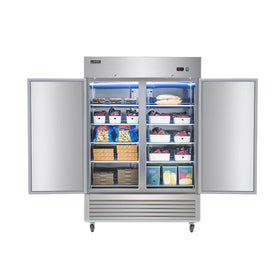Butter, whether salted or not, can be refrigerated for long-term storage. However, butter is made from cream, a dairy product, which means it will spoil if not stored properly. Refrigerating your butter, therefore, is a good idea because it helps:
-
Prevent bacterial growth
-
Slow down oxidation (rancidity)
-
Maintain flavor and texture
The cold temperature of the refrigerator helps preserve butter’s quality and safety for longer periods, especially if you don’t intend to use it quickly. But how long should your butter last in the fridge before going bad?
How Long Does Butter Last in the Fridge?
Generally, both salted and unsalted butter can last about two months in the fridge if you store it wrapped in its original paper at regular temperatures of about 40°F (4°C) or lower. However, salted butter tends to last about a month longer than unsalted butter.
-
Because salt acts as a natural preservative, salted butter can last between 3-4 months in the fridge if unopened and stored at the appropriate temperature.
-
Unsalted butter, on the other hand, has no natural preservatives. It typically can last up to about 1 to 2 months in the fridge.
How Long Does Butter Last in the Fridge/Freezer?
|
Storage Type |
Salted Butter |
Unsalted Butter |
|
Fridge |
Up to 3 months |
1–2 months |
|
Freezer |
6–9 months |
6–9 months |
How To Store Butter in The Refrigerator So It Lasts Longer.
How long butter stays in the fridge also depends significantly on how well it is stored. Here are some practical, easy-to-follow tips for storing butter in the refrigerator such that it not only lasts for a long time, but also remains fresh, flavorful, and safe.
i. Keep It in Its Original Wrapper
Butter’s paper wrapping is designed to protect it from air, light, and odor absorption, so don't take it off! For added protection, you can even place the wrapped stick in a covered butter dish or container.
ii. Use Exclusively Airtight Containers
Butter can absorb strong fridge odors (like onions, garlic, or fish), which will cause it to become rancid. Store it in an airtight, opaque container to prevent such unwanted flavors and keep it from light exposure, both of which can cause it to become rancid.
iii. Always Separate Salted from Unsalted Butter
Label and store salted and unsalted butter separately to avoid mixing them up. Not only do they have different shelf lives, but they are also used in different recipes. Unsalted butter spoils faster, so use it more quickly and store it deeper in the fridge.
iv. Store Butter in the Coldest Part of the Fridge
Do not store butter in the fridge door, where temperatures fluctuate most. Place it at the back of a middle or lower shelf, where it is more likely to stay consistently cold (ideally 32–40°F / 0–4°C).
v. Rotate Your Stock
Remember to follow the FIFO rule: First In, First Out when taking out and using your butter. Use older butter before newer purchases. Mark the purchase or freeze date on the wrapper or container to keep track.
Can You Freeze Butter?
There is no reason to be skeptical of freezing butter. Butter freezes beautifully, whether it’s salted or unsalted. If stored properly, freezing can extend its shelf life significantly, up to about 9 months without affecting taste or texture.
Follow these steps when freezing butter:
-
Wrap tightly in foil, parchment, or freezer-safe plastic wrap.
-
Store in an airtight freezer bag or container to prevent odor absorption or freezer burn.
-
Freeze in sticks or pre-portioned cubes for convenience.
Label with date and use it within 6–9 months for the best flavor. Thaw in the refrigerator for a day or on the counter for a few hours before use.
Freezing should always occur at 0°F (-18°C) or colder to stop bacterial activity completely.
Recommended Butter Storage Temperatures
|
Storage Method |
Temperature Range |
Notes |
|
Refrigerator |
32–40°F (0–4°C) |
Ideal for daily storage |
|
Freezer |
0°F (-18°C) or lower |
Best for long-term preservation |
How Do Restaurants Store So Much Butter (and Other Dairy Products)?
The secret to bulk storage of butter lies in proper wrapping and energy-efficient commercial refrigerators and freezers. Restaurants store butter in bulk, so they tend to store the extra sticks in large-capacity commercial freezers.
The best commercial freezers are capable of maintaining consistent freezing temperatures, usually 0°F / -18°C or lower, which is suitable for delicate dairy products like butter, milk, cream, cheese, and yogurt.
Single-door commercial freezers like this 27" Commercial Solid Door Reach-In Freezer from Wilprep are especially common in smaller restaurant kitchens, and here’s why:
- It offers a volume of 18.7 cu. ft. and a temperature range of -11 to 14°F.
-
Comes with a Cubigel compressor and copper evaporator to ensure fast, even cooling and optimal temperature levels.
-
5 adjustable shelves, each holding up to about 88 lbs, for customizable storage of different foods and items.
-
It is certified for safety and quality by ETL, ETL Sanitation, and DOE. Safe for use in a commercial kitchen.
Usually, butter is wrapped well with foil or plastic wrap before being placed in a freezer bag to protect it from freezer burn and odors. With the space, capacity, and energy efficiency of these high-volume commercial refrigerators and freezers, restaurants are able to store their butter for longer periods.
How to Store Butter-Related Foods in the Fridge
Butter isn’t always dairy. Here’s how to store other products like peanut butter, nut butters, apple butter, and others that are commonly called “butter,” each with different rules:
|
Product |
Refrigerate? |
Shelf Life |
Notes |
|
Salted Butter |
Optional |
2–3 months (fridge) |
Safe at room temp short-term |
|
Unsalted Butter |
Yes |
1–2 months |
Spoils faster |
|
Frozen Butter |
Yes (freeze) |
6–9 months (0°F/-18°C) |
Wrap well; thaws easily |
|
Natural Nut Butters |
Yes |
3–6 months (fridge) |
Oils can go rancid |
|
Commercial Nut Butters |
No |
6–9 months (room temp) |
Stabilized |
|
Apple Butter |
After opening |
1–3 months (fridge) |
High sugar preserves it |
|
Buttercream (American) |
Optional |
2–3 days (room); 1–2 weeks (fridge) |
Sugar stabilizes |
|
Buttercream (Meringue) |
Yes |
About 1 week |
Contains egg whites |
|
Butter Chicken |
Yes |
3–4 days (fridge) |
Freeze if storing longer |
|
Buttermilk |
Yes |
7–10 days (opened) |
Always perishable |
Final Thoughts
“Does butter need to be refrigerated?” isn’t a one-size-fits-all question. The answer depends on the type of butter, how long you’ll store it, and your environment. When in doubt, refrigerate it. That’s your safest bet for flavor, freshness, and food safety.
You may also be interested in more guides on how to freeze vegetables and how to store apples in the fridge










